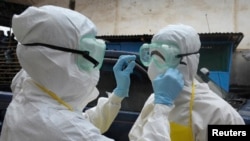An emergency research call has been launched to help fight the world's worst Ebola outbreak in West Africa, with the British government and the Wellcome Trust medical charity pledging a combined 6.5 million pounds ($10.8 million).
Expert teams from around the world are being invited to submit research proposals by Sept. 8 for initiatives that can rapidly investigate new approaches to treating, preventing and containing the disease.
"The gravity of the Ebola epidemic in West Africa demands an urgent response, and we believe rapid research into humanitarian interventions and therapeutics can have an impact on treatment
and containment during the present outbreak," Jeremy Farrar, Wellcome's director, said in a statement.
Ebola Virus: How to Prevent Spreading the Disease
Ebola Virus: How to Prevent Spreading the Disease
- Avoid physical contact with people showing symptoms: continuous high fever, red eyes, vomiting and stomach ache.
- Wash hands thoroughly and frequently, including under the fingernails. Use soap and clean water; use hand sanitizer if soap is not available.
- Use gloves when taking care of infected patients.
- Avoid contact with raw meat; cook all animal food and by-products thoroughly.
- Avoid bush meat; avoid buying or eating the wild animals, including nonhuman primates.
- Avoid areas of known outbreaks.
- Do not touch anyone who has died from Ebola.
Sources: Centers for Disease Control and Prevention, Mayo Clinic, Plan International
Wellcome, the world's second highest-spending charitable foundation, also announced a long-term investment in African science worth 40 million pounds on Thursday.
There are no proven treatments or vaccines for Ebola but the World Health Organisation has backed the use of untested products and is hoping for improved supplies of experimental
drugs by the end of the year.
British scientists said earlier that up to 30,000 people would have so far needed such treatments or vaccines in the current outbreak, which has killed more than 1,300 people.





